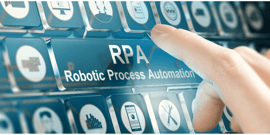BP3 GLOBAL-SERVICE
Data Science in Process Transformation
David Brakoniecki joins Krista White to explain data science in process transformation and how it is being used today.
Krista : Thank you, Brak, for joining us today. Today we are talking about Data Science, and why it's made this emergence in process transformation. So can you tell me a little bit about how data science is working into process transformation, and what people are using it for, what's happening, and why it's become so big?
Brak: I think that the first thing to start with is in process transformation, we've always had data science. You've always had Lean Six Sigma. All of BPM technology, all of process transformation is really founded on these sort of foundations. Those were all about statistical analysis to find error variance. The difference between now and in the past is really how easy it is to use data science or cognitive techniques to change your business.
So in the past, you'd have to get a Sic Sigma black belt, these guys go through years of training. You send 'em in, they would do a specific piece of work, they'd find a specific problem, they would give you a solution to that problem. It would be great, life would be better. Then you'd move that expensive resource on somewhere else and he'd do the same thing again somewhere else. And then a year later he'd have to go back to where he was first put because it all slid back.
But now today, technology's moved on, right? So the algorithms, the kinds of tooling the Six Sigma backup had to learn all these different statistical techniques, he had to gather the data, he had to run it through ... That's all stuff that technology provides now. So people at the click of a button can see the process transformation. They can see the output. It's a lot easier for normal business users to consume advanced data science techniques because the data science is hidden in the technology, and that means that process transformation can use data science every day as opposed to when the really highly-trained expert is available. It doesn't mean these experts aren't important, or they don't exist. Of course, they are! But it also means it's easier for normal people every day to use data science and to get started with it.
Krista: So what are some of your favorite tools or methods for mining data and creating better data outcomes in process transformation?
Brak: I think a lot of it comes down very much to the use case in the industry, so you can't generalize too much across everything. But really, the best use cases are when you take the data science technique and you embed it into the process journey so it's completely invisible to the end users. It's just a seamless part of his every day experience. If you look at things like Zendesk, Zendesk in the enterprise version, they have predictive analytics. If you have more than 500 users they're giving you a score of what they think the net promoter score of that ticket is when you submit the ticket and as you work the ticket. That means they have algorithms trained to your situation, your customers, how you use their tool, and they're predicting what's gonna happen at the end of the process.
So your users can use that kind of data science. Before, if you wanted that kind of insight, you would have had to hire a data scientist, hire a technical team to build a data warehouse, use the data scientist to write your own algorithms, and then maybe embed the solution into that. It would take years to do, it would be an expensive solution. Now when you buy a Zendesk subscription at enterprise level, you get it for free. You see the same patterns with IBM embedding Watson and Einstein into Salesforce. You put your Salesforce data in, you use it, you get insight into how your customer journeys are, what kind of customers you should be tracking. That kind of seamless interaction between data science techniques happening around the edges and by the corner, but embedded in the process context, is really powerful.
Krista : Well thanks, Brak, for joining us today, and for giving us a little bit more into data science in process transformation!


